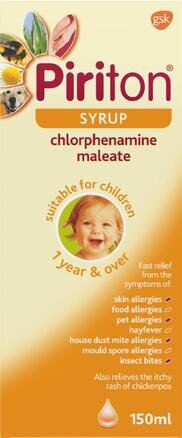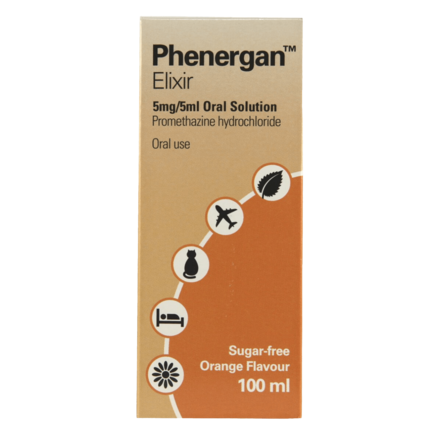Online Doctor
Allergy & Hayfever
When your child is suffering from hay fever or an allergic reaction, you want quick and easy relief for them. At Pharmacy Online, we have a dedicated range of products to provide lasting relief from skin allergies, itchy eyes, insect bites, hay fever and more.
Discover our wide range of children's allergy and hay fever relief medication here at Pharmacy Online. Find nasal sprays and allergy syrup, specially formulated for children.
Shop now for next day delivery
What causes an allergic reaction?
Allergies occur when your child's immune system overreacts to substances that are usually harmless to most people. These substances, known as allergens, can include things like pollen, pet dander, dust mites, or certain foods.
When your child encounters an allergen, their body sees it as an invader and releases chemicals like histamine to protect itself. This release causes symptoms that can be mild, like a runny nose or itchy eyes, or more severe, such as difficulty breathing, which would require immediate medical attention.
This overreaction can lead to symptoms that range from annoying to serious.
Understanding what triggers these reactions in your child helps manage their discomfort. Simple steps like monitoring pollen count, keeping the house dust-free, or consulting with a specialist can make a significant difference.
What are the symptoms of an allergic reaction in children?
Spotting the signs early of an allergic reaction can be a big help in catching it before it progresses. Here's what you might notice if your child is having an allergic reaction:
Skin changes: This is often the most visible sign. You might see red, itchy rashes, hives, or swelling.
Breathing issues: Keep an ear out for wheezing or coughing, and watch for any trouble breathing or shortness of breath, especially if your child seems unusually quiet or still.
Stomach upset: Nausea, vomiting, or diarrhoea can sometimes accompany allergies, particularly food allergies.
Nasal symptoms: A runny or stuffy nose, sneezing, or an itchy nose are common for environmental allergies.
Eye discomfort: Red, itchy, or watery eyes are also typical.
Always remember that managing allergies is very doable with the right care and precautions. If you're unsure or need guidance, a chat with your child's doctor or an allergist can provide personalised advice and peace of mind.
When should I seek medical help for an allergic reaction?
If your child shows any severe symptoms like swelling around the mouth, the lips, tongue, or throat, difficulty breathing, a sudden drop in blood pressure (they might look very pale or floppy), or a severe asthma attack, it's important to seek medical help right away as these could be signs of a potentially life-threatening reaction called anaphylaxis.
Here are some situations when you should seek medical attention:
Rapid onset of symptoms: Fast-developing symptoms right after exposure to a known allergen are a red flag.
Combination of symptoms: Multiple symptoms occurring at once, such as a rash combined with difficulty breathing, should always prompt immediate medical attention.
No improvement: If mild symptoms, such as hives or a mild rash, do not improve with over-the-counter antihistamines or other allergy relief, or if your child seems increasingly uncomfortable.
If unsure: If you're ever in doubt about the severity of an allergic reaction or how to handle it, it's better to err on the side of caution and consult a healthcare professional.
Always keep emergency numbers handy, and if your child has a known severe allergy, make sure to have an epinephrine auto-injector (EpiPen) available and know how to use it.
If your child is experiencing what you suspect might be anaphylaxis, don't wait—call emergency services right away.
Shop now for next day delivery
Recognising hay fever symptoms in children
When it comes to spotting hay fever symptoms in children, it pays to be observant as these symptoms can sometimes be mistaken for a common cold:
Sneezing and runny nose: Frequent sneezing and a clear, watery nasal discharge are telltale signs.
Itchy, red, or watery eyes: Hay fever often causes an irritation that makes children rub their eyes more than usual.
Nasal congestion and coughing: You might notice that your child sounds congested or has a cough. This is due to mucus from the nasal passages dripping down the back of the throat.
Itchy sensations: Children with hay fever might complain of an itchy nose, throat, or even ears.
Worsening of symptoms outdoors: Hay fever symptoms can flare up when your child is playing outside, especially on high pollen days.
Fatigue: If your child is not sleeping well due to their symptoms, they may seem unusually tired or irritable.
If symptoms persist or affect your child's daily activities, seek advice from a healthcare professional to explore further management options and treatments.
Treatments for allergy and hay fever
When it comes to managing allergy and hay fever symptoms in children, you have several treatment options: antihistamines, nasal sprays, and eye drops. Each has its benefits and is used based on the symptoms they best relieve.
Antihistamines
Antihistamines are often the first line of treatment for allergy symptoms. They work by blocking histamine, the substance released by the immune system during an allergic reaction that causes itching, swelling, and mucus production. Antihistamines can help relieve sneezing, itching, runny nose, and hives.
They come in various forms suitable for children, such as liquid syrups, chewable tablets, and standard allergy pills. Some antihistamines may cause drowsiness, so non-drowsy formulations are available and may be preferable for daytime use in active kids.
Nasal sprays
Nasal sprays can be very effective, especially for nasal symptoms like congestion. There are different types, including:
Steroid nasal sprays are very effective for controlling severe and persistent nasal symptoms. They reduce inflammation in the nasal passages and are safe for long-term use in children when used as directed.
Antihistamine nasal sprays work similarly to oral antihistamines but are applied directly in the nose for localised relief.
Saline nasal sprays, such as Neilmed nasal mist, Snufflebabe saline spray, or Calpol saline nasal drops, are a gentle option that helps to clear out mucus and allergens from the nose and can be used frequently without side effects.
Eye drops
For children suffering from itchy, watery eyes, antihistamine eye drops can provide relief. Some eye drops also contain mild decongestants to reduce redness. It's important to use eye drops specifically formulated for children and allergy relief, as not all eye drops are suitable for treating allergy symptoms.
Shop now for next day delivery
How to choose the right medicine
Identify the symptoms: When choosing a treatment, understand what you're treating: is it sneezing, a runny nose, itchy eyes, or skin rashes? Different medications target different symptoms.
Speak to a doctor: If you're treating allergies in a child for the first time, a doctor can confirm whether the symptoms are due to allergies and can recommend appropriate medications.
Consider the type of medication: For younger children, liquid forms, chewable tablets, or single-dose dissolvable strips might be easier to administer than pills. Nasal sprays and eye drops are good for targeted symptoms but check if your child can tolerate these.
Check the active ingredients:
Antihistamines like loratadine, cetirizine, and fexofenadine are commonly used and effective for sneezing, runny nose, and itching. They're available over the counter and have a good safety profile for children.
Nasal corticosteroids like fluticasone and mometasone are highly effective for nasal congestion and inflammation if allergies are severe.
Decongestants are used sparingly in children due to potential side effects but can be helpful for short-term relief of nasal stuffiness.
Read the labels: Always ensure the dosage is appropriate for your child's age and weight, and follow the guidance of a healthcare professional to prevent any potential side effects.
Remember, if symptoms persist or worsen, it may be necessary to adjust the treatment strategy or explore other options with your child's doctor.
Buy allergy and hayfever medicine for kids from Pharmacy Online
Choose from our trusted range of child-friendly antihistamines, nasal sprays, and eye drops at Pharmacy Online. Get the relief your little ones need with products specifically tailored for children.
Piriton Antihistamine Allergy... In stock
From £4.39Phenergan Elixir (5mg/5ml... Out of stock
From £8.99
FAQ
What is the best hay fever medication for children?
Finding the right hay fever medication for your little one depends on their age and the symptoms they're experiencing. Oral antihistamines like cetirizine or loratadine are generally safe and effective for many kids. For tailored advice and a range of options, visit Pharmacy Online.
Can you buy antihistamines for children over the counter?
Yes, you can. Antihistamines suitable for kids, like cetirizine syrup and loratadine chewables, are readily available over the counter. Just make sure to follow the age and dosage guidelines on the package. Check out Pharmacy Online for trusted products.
What’s the best antihistamine for itchy skin?
If your child is struggling with itchy skin due to allergies, non-drowsy options like cetirizine can provide relief without interfering with their day. You can find a variety of options at Pharmacy Online.
What home remedies can help my child's hay fever?
Simple steps like using an air purifier, keeping windows closed during high pollen days, and rinsing your child’s nasal passages with saline solution can significantly ease hay fever symptoms.







